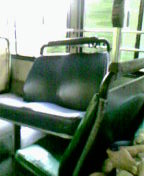 Some have bemoaned the decline of English language competency and an interest in speaking well in the same language in Singapore. I am not. Let me explain why.
Some have bemoaned the decline of English language competency and an interest in speaking well in the same language in Singapore. I am not. Let me explain why.Throughout my school years, I have been taught by one expatriate teacher or another (mostly hailing from Great Britain). Equally, if not more so, I have been schooled by locals whose mother tongue was probably either Chinese, Malay or Tamil, but who were just as competent in written and spoken English. For whatever reason, but certainly not smugness nor arrogance, I developed the habit to speak in complete English sentences, so much so that some people who did not know me better tended to think that I had been schooled in Britain or some ang moh country. That's because they taught I spoke like them, intonation, language construction and all.
The fact is, I wasn't them, and didn't want to appear to be them. So whenever I was interacted with Singaporeans, I tended to 'step-down' my language and learnt to speak Singlish all over again. Will this destroy the standard of the language I had spent many years to learn and attain? I do not think so. I found that conversation among fellow Singaporeans just felt more natural the Singlish way. People could understand me better and faster without my speaking in complete sentences. To a certain extent, that was a revelation to me. I had re-discovered my childhood 'tongue'.
Does that mean my schooling in the English language all those many years (right up to University) was all wasted? No, I don't think so either. I still speak in complete sentences when the occasion calls for it, and of course, I write in complete sentences too, when it is appropriate. I think people tend to adopt the correct register for the appropriate occasion. To say that a person's English competency is necessarily sloppy just because he doesn't speak in complete sentences, or speaks Singlish, is plain rubbish. This is not to encourage students to speak pasar English in class. There is a difference between the formal and informal use of the language. Both are important. Both are necessary.
So one should never jump to conclusions about any perceived decline in the English language in Singapore. As in all longitudinal changes, it will take a while before a pattern becomes consistently clear. Then, when the evidence suggests so, can a clearer statement be made.
Image source: http://www.utexas.edu/








 Well, who wants to take the bus in Singapore if they had a choice not to? In status conscious Singapore, everyone will prefer to be driving and seen to be driving a car - the latest model if possible, just like their handphones. The only way you can do that is to make the cost of owning your own set of wheels so prohibitively expensive that you have no choice but to take the bus and/or the train to get around.
Well, who wants to take the bus in Singapore if they had a choice not to? In status conscious Singapore, everyone will prefer to be driving and seen to be driving a car - the latest model if possible, just like their handphones. The only way you can do that is to make the cost of owning your own set of wheels so prohibitively expensive that you have no choice but to take the bus and/or the train to get around.